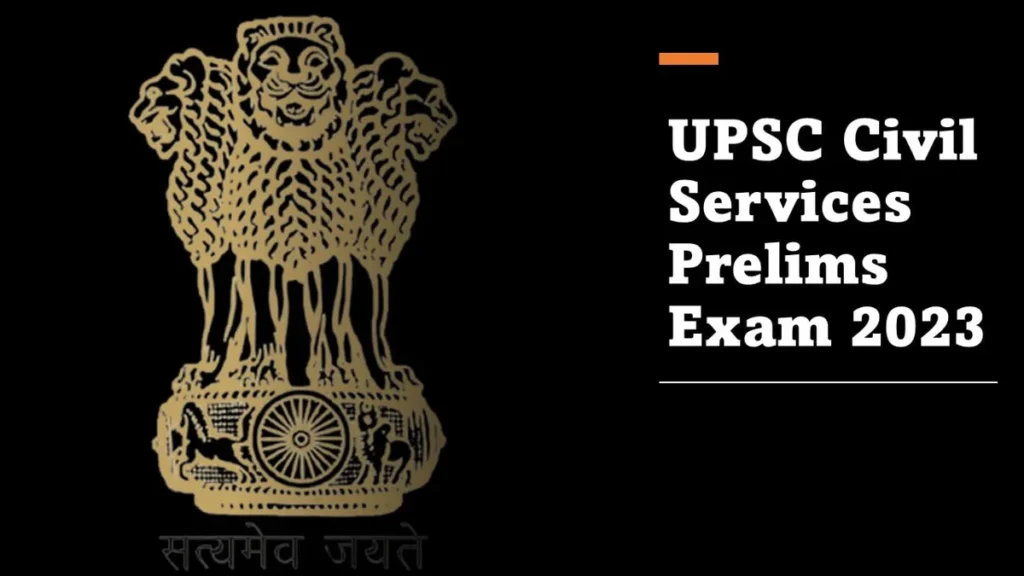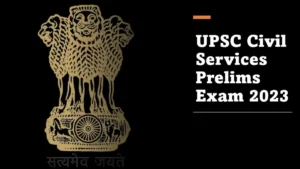The Union Public Service Commission (UPSC) conducts various examinations for recruitment to various posts in the Indian government. The syllabus for each exam may vary, but here are the general topics that are covered in the UPSC exams:

Preliminary Exam (Civil Services Preliminary Examination)
Paper 1: General Studies
- Current events of national and international importance
- History of India and Indian National Movement
- Indian and World Geography – Physical, Social, Economic Geography of India and the World
- Indian Polity and Governance – Constitution, Political System, Panchayati Raj, Public Policy, Rights Issues, etc.
- Economic and Social Development – Sustainable Development, Poverty, Inclusion, Demographics, Social Sector Initiatives, etc.
- General issues on Environmental ecology, Bio-diversity and Climate Change – that do not require subject specialization
- General Science.
Paper 2: Aptitude Test (CSAT)
- Comprehension
- Interpersonal skills including communication skills
- Logical reasoning and analytical ability
- Decision-making and problem-solving
- General mental ability
- Basic numeracy (numbers and their relations, orders of magnitude, etc.) (Class X level), Data interpretation (charts, graphs, tables, data sufficiency, etc. – Class X level)
- English Language Comprehension skills (Class X level).
Mains Exam (UPSC syllabus)
The Main exam consists of 9 papers, but the 7th paper is only qualifying in nature and the marks obtained in this paper are not counted towards the final merit list. The papers are as follows:
Paper 1: Essay
Essay Writing: a. Candidates are required to write two essays, choosing one topic from each section. b. The topics will be based on current affairs, socio-political issues, philosophical thoughts, and general interest subjects. c. Candidates must analyze the topic critically, present a balanced view, and provide arguments supported by facts, examples, and logical reasoning. d. Essays should be coherent, well-structured, and demonstrate a comprehensive understanding of the topic.
Topics Covered: The topics for the essay paper can vary each year, but they generally encompass a wide range of subjects. Some common themes include:
Social Issues:
- a. Gender equality and women empowerment.
- b. Education and its role in societal development.
- c. Poverty, inequality, and social justice.
- d. Caste system, discrimination, and social exclusion.
- e. Rural development and agrarian crisis.
Governance and Public Policy:
- a. Role of bureaucracy in policy implementation.
- b. Good governance and accountability.
- c. Electoral reforms and political participation.
- d. E-governance and its impact on service delivery.
- e. Ethics and integrity in public administration.
Economy and Development:
- a. Sustainable development and environmental conservation.
- b. Economic reforms and liberalization.
- c. Poverty alleviation and inclusive growth.
- d. Infrastructure development and urbanization.
- e. Digital economy and its challenges.
Science, Technology, and Innovation:
- a. Ethical dimensions of scientific research.
- b. Space technology and its applications.
- c. Artificial intelligence and its impact on society.
- d. Biotechnology and genetic engineering.
- e. Cybersecurity and data privacy.
International Relations:
- a. Globalization and its implications.
- b. Role of India in the changing global order.
- c. India’s relations with neighboring countries.
- d. Terrorism, regional conflicts, and peacekeeping.
- e. Climate change and global cooperation.
Paper 2: General Studies 1
- Indian Heritage and Culture, History and Geography of the World and Society
Indian Heritage and Culture:
- a. Indian art, architecture, and sculpture.
- b. Indian classical music, dance forms, and theater traditions.
- c. Literature, poetry, and major literary works.
- d. Philosophical traditions, religious movements, and thinkers.
- e. Cultural and historical sites of importance.
- f. Preservation and promotion of Indian heritage.
History and Geography of the World and Society:
- a. World history, ancient civilizations, and their contributions.
- b. Industrial revolution and its impact on global society.
- c. Decolonization and post-colonialism.
- d. Globalization and its social, economic, and cultural aspects.
- e. Impact of technology on society and human interactions.
- f. Indian society in the context of global changes.
Indian Society, Diversity, and Social Issues:
- a. Salient features of Indian society, diversity, and unity.
- b. Social issues related to poverty, inequality, and social justice.
- c. Communalism, regionalism, and caste-based discrimination.
- d. Gender and women’s issues, empowerment, and rights.
- e. Social reforms and social movements in India.
- f. Role of civil society organizations in societal development.
Role of Women and Women’s Organizations:
- a. Women’s organizations and their contributions to social change.
- b. Gender equality, empowerment, and rights.
- c. Laws, policies, and initiatives for the welfare of women.
- d. Challenges and issues faced by women in various spheres.
- e. Role of women in nation-building and governance.
Note: Paper 2 also includes comprehension-based questions based on passages, but there is no specific syllabus for this section.
Topics Covered: The topics within each subject area may vary, but they generally cover a wide range of aspects related to Indian heritage, history, society, and current affairs. Some common themes include:
Ancient and Medieval India:
- a. Indus Valley Civilization and its key features.
- b. Mauryan and Gupta Empires and their contributions.
- c. Medieval kingdoms, dynasties, and cultural exchanges.
- d. Bhakti and Sufi movements and their impact on society.
- e. Emergence of regional kingdoms and their significance.
Modern Indian History:
- a. Freedom struggle and the role of key leaders.
- b. Socio-cultural and religious reform movements.
- c. Partition and the emergence of India and Pakistan.
- d. Post-independence consolidation and nation-building.
- e. Economic reforms and liberalization in India.
Indian Geography:
- a. Physical geography of India and its major features.
- b. Climate, monsoons, and their impact on agriculture.
- c. Natural resources, minerals, and energy resources.
- d. Environmental issues and conservation measures.
- e. Regional planning and sustainable development.
Social Issues in India:
- a. Poverty, unemployment, and social inequality.
- b. Education and health-related issues.
- c. Communalism, caste-based discrimination, and religious conflicts.
- d. Tribal rights and their protection.
- e. Empowerment of marginalized communities.
Paper 3: General Studies 2
- Governance, Constitution, Polity, Social Justice and International relations
Paper 4: General Studies 3
- Technology, Economic Development, Bio-diversity, Environment, Security and Disaster Management
Paper 5: General Studies 4
- Ethics, Integrity and Aptitude
Paper 6 and 7: Optional Subject Paper 1 and 2
- Candidates have to choose an optional subject from the given list and write two papers.
Paper 8: English Language (UPSC syllabus)
- Candidates have to write an essay and a precis.
Comprehension:
- a. Reading comprehension passages.
- b. Understanding the main idea, supporting details, and inferences.
- c. Vocabulary-based questions.
- d. Synonyms, antonyms, and analogies.
- e. Critical reasoning and logical deduction.
Grammar and Usage:
- a. Parts of speech and their usage.
- b. Tenses, verb forms, and agreement.
- c. Sentence structure, sentence correction, and rearrangement.
- d. Active and passive voice.
- e. Direct and indirect speech.
Vocabulary:
- a. Word meanings, synonyms, and antonyms.
- b. Idioms, phrases, and proverbs.
- c. Contextual usage of words.
- d. Word formation and spelling.
- e. One-word substitution.
Precis Writing:
- a. Summarizing a given passage or paragraph.
- b. Condensing the main ideas and key points.
- c. Maintaining coherence and logical flow.
- d. Following the prescribed word limit.
- e. Demonstrating clarity and conciseness.
Essay Writing:
- a. Writing essays on given topics.
- b. Organizing ideas and arguments logically.
- c. Developing a clear thesis statement.
- d. Providing relevant examples and evidence.
- e. Demonstrating coherence, coherence, and depth of analysis.
Letter Writing:
- a. Writing formal and informal letters.
- b. Understanding the format and structure.
- c. Expressing ideas clearly and appropriately.
- d. Using appropriate salutations and closings.
- e. Addressing the purpose and tone of the letter.
Report Writing:
- a. Writing reports on given topics or situations.
- b. Organizing information in a structured manner.
- c. Presenting findings, analysis, and recommendations.
- d. Maintaining objectivity and clarity.
- e. Using appropriate headings and subheadings.
Grammar in Communication:
- a. Using correct grammar in spoken and written communication.
- b. Sentence construction and formation.
- c. Subject-verb agreement and tense consistency.
- d. Error identification and correction.
- e. Common grammatical errors and their resolution.
Paper 9: Indian Language
- Candidates have to choose one of the languages from the Eighth Schedule of the Constitution and write an essay and a precis.
Interview (UPSC syllabus)
- Candidates who clear the Mains exam are called for an interview.
- The interview tests the candidate’s personality traits, general knowledge, and ability to handle stressful situations.
Note: The syllabus for other UPSC exams such as the Indian Forest Service Examination, Engineering Services Examination, Combined Defence Services Examination, etc. may vary.
| UPPSC syllabus | Click here |
| UPSC Official Website | Click here |
